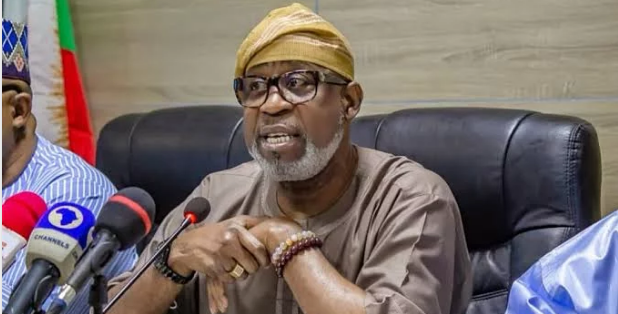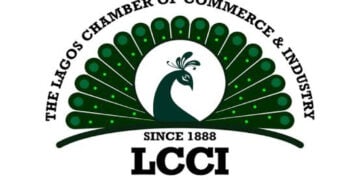The Federal Government has disclosed a significant increase in the mining sector’s contribution to Nigeria’s Gross Domestic Product (GDP), which has grown from 0.5 per cent over the past decade to 4.61 per cent currently.
The Minister of Solid Minerals Development, Dr Oladele Alake, made this revelation during a pre-event press briefing ahead of the 10th edition of the Nigeria Mining Week, scheduled to take place from October 13 to 15, 2025, in Abuja.
According to Dr Alake, the sector’s growth has been driven by “innovative policies” introduced by the current administration, which have quadrupled earnings from the sector, with expectations that its contribution to GDP will “rise exponentially in the coming years.”
Dr Alake further stated that Nigeria’s reform agenda was resonating beyond its borders, with several African nations adopting its value-addition policy.
This development led to the formation of the Africa Minerals Strategy Group, of which Alake was selected as the pioneer chairman. The group’s mission is to ensure Africa gets the best deals from its mineral deposits through local beneficiation rather than exporting minerals in their raw forms.
The Minister also noted that the Community Development Agreement developed by the ministry was receiving praise beyond Nigeria.
Highlighting reform challenges, the Minister disclosed that he had personally received threats from individuals whose selfish interests had been undercut by the new regulatory framework. Despite this, he affirmed that neither he nor his team would be deterred in their commitment to ensure that mining is regulated to contribute its fair share to Nigeria’s economic diversification agenda.
He also disclosed plans to further plug revenue leakages in the sector by introducing pre-shipment inspection of solid mineral export cargo.
Delivering remarks from a prepared address, the Minister initially noted that the mining sector’s contribution had risen from under 0.5 per cent to approximately 1.8 per cent, with a target of 3 per cent in the medium term. However, during a question-and-answer session with journalists, he clarified that the National Bureau of Statistics (NBS) had recently updated the figure to 4.61 per cent at an event he attended.
“In fact, yesterday, when I was making a presentation to the National Economic Council and stated the previous figures, the NBS Director-General was also there, and he disputed my figures. He said that in Quarter 2 of this year — or last year — the GDP contribution of mining had increased phenomenally. He mentioned a figure of 4.61 per cent.”
Dr Alake described the upcoming Nigeria Mining Week as a key platform for stakeholders to evaluate progress, identify challenges, and align on policy priorities.
“It is not just a technical convening but an opportunity to reinforce our national objectives around value addition, environmental responsibility, and community development,” he added.
He explained that under the Renewed Hope Agenda, the Ministry had implemented several structural reforms to strengthen governance and enhance transparency. These include: Strengthening the Solid Minerals Development Fund (SMDF) to support project financing and attract private investment; Expansion of geological mapping and digitisation of mineral data to improve access for prospective investors; Establishment of Mining Marshals, in collaboration with security agencies, to tackle illegal mining and improve safety in mining areas; and Operational reforms at the Mining Cadastral Office, ensuring a more transparent and accountable licensing system.
Dr Alake reiterated the Ministry’s shift from raw mineral exports to a focus on beneficiation and value addition, aligning the sector with broader national goals such as industrialisation, employment creation, and sustainable development.
The Minister noted that this year’s event will include strategic discussions on critical minerals, infrastructure, and investment frameworks, particularly in light of the global energy transition and rising demand for lithium and rare earth elements.
According to him, 100 exhibitors and over 1,000 participants from Nigeria, Africa, Asia, and Europe will attend.
President of the Miners Association of Nigeria, Mr Dele Ayanleke, hailed the Mining Week as a landmark in the nation’s mining journey.
“This event marks a decade of dialogue, innovation, and collaboration across the sector,” he said.
He commended the Minister for his leadership and acknowledged the vital role of stakeholders, sponsors, and partners in promoting responsible mining, formalising artisanal practices, and attracting investment.
However, Mr Ayanleke also acknowledged ongoing challenges, including illegal mining, insecurity, and infrastructure gaps, which he described as “opportunities for deeper reform and collaboration.”
In his presentation, Habeeb Jaiyeola, a partner at PricewaterhouseCoopers (PwC), underlined the Mining Week’s role as the premier forum for shaping Nigeria’s mining discourse:
“It continues to be the leading platform for consensus-building and crafting solutions that position mining as an engine of shared prosperity.”
Meanwhile, Samukelo Madlabane of the VUKA Group, one of the event’s organisers, revealed that this year’s edition will spotlight areas such as exploration finance, the emergence of indigenous junior miners, and the creation of a globally competitive investment climate.
He noted that the event, which had just 200 participants a decade ago, has expanded significantly, with 3,500 attendees expected this year.
The 10th Nigeria Mining Week will also feature new segments, including Deal Rooms, Technical Workshops, and Strategic Forums — all designed to deepen investment and knowledge exchange across the sector.





